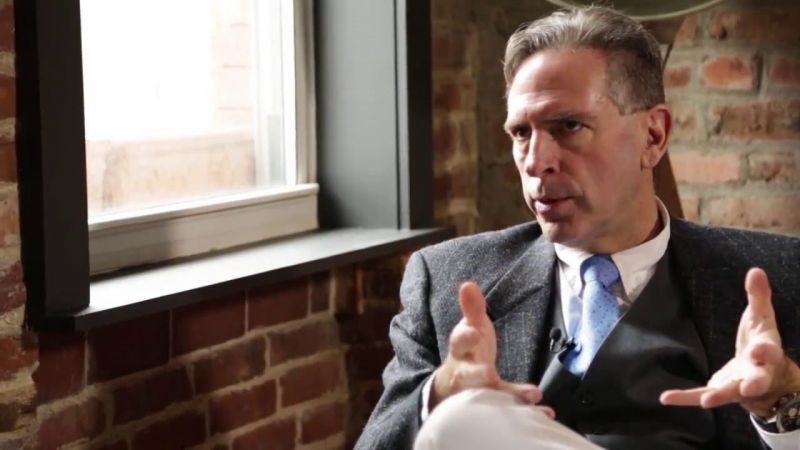The Identification Trap
You're not your thoughts and feelings.
Escrito por John F. Emilio

01 John has experienced OCD and anxiety for as long as he can remember. ACT helped him break free from negative cycles of thinking and regain control of his symptoms.
02 Much of OCD's power comes from forcing us to accept our thoughts as truth. John explains the power in being a watcher of your thoughts, rather than a person defined by them.
03 The language we use to understand our symptoms can facilitate true healing.
As a person who has experienced OCD for much of my life, I know all too well what it's like to spend most days living in fear of my thoughts.
I’ve spent years working on creating a better relationship with my mind, learning to accept it as it is and become a “watcher” of my thoughts. Through my advocacy work, I've had people ask me how I got to a healthy place. How did I overcome OCD? How did I stop my thoughts and find peace?
The thing is, I didn't stop them. Instead, I gave my mind permission to bring them up and worked on accepting them as they are. Much of my mental health journey has revolved around acceptance — and not just of my thoughts. Accepting all things as they are right now, not how my mind wants them "to be."
But how do you accept that all problems cannot be solved? This isn't intuitive, as our brains have evolved over millions of years to be problem-solving machines. Dr. Steven Philipson from the Center for Cognitive-Behavioral Psychotherapy in New York City presents the idea of The Gate Keeper. Instead of identifying with our thoughts, we can bring awareness of them and become a “watcher” instead.

Living with Intrusive Thoughts & Pure O
Dr. Phillipson defines intrusive thoughts and Pure O. He analyzes the different types of OCD and explains what life is like for sufferers.
As an advocate, I see many people experiencing OCD, anxiety, depression and other conditions defining themselves by their disorder. They say "I am OCD" or "I am anxious" or "I am depressed." The key to freedom here is realizing that you are NOT your thoughts or emotions. You experience those as a watcher. Our experiences do not have to be our identities.
Once I learned to stop saying I am my thoughts and feelings, they started to become just... thoughts and feelings. The stories my mind created quieted down. This led to less attachment and identification with them. I learned to say "I am experiencing a pleasurable feeling" or an "unpleasant feeling." This allowed me to have the feeling, truly feel it, lean into it, and allow it to pass without letting it define me.
Whatever thought or emotion is happening, is happening. We don’t deny it, but we also don’t create a story in which it represents who we are. For me, having a more structured approach to practicing acceptance and defusion was greatly healing.
Thankfully, I gained many fantastic tools from Acceptance and Commitment Therapy (ACT) that helped me on this journey. Through practicing ACT, I learned to create space between myself and my thoughts, and in doing so, become a watcher. While Exposure and Response Prevention therapy (ERP) — the go-to for OCD treatment — helped me habituate to some of my intrusive thoughts, I still felt like I was identifying with them. I realized I was still saying I was someone who "has" OCD and anxiety, and by having these I was them (identification).
By reframing my relation to mental illness, I experienced freedom. A small nuance like changing the language we use can have a tremendous effect. I am someone who experiences something, but I am not that thing. That separation helped me create space and, in that space, awareness. That loss of identification led me to go from surviving to thriving. Our minds produce all sorts of thoughts, but thoughts are not inherently good or bad. They are just thoughts.
Now, when I experience a thought like “What if I grabbed the knife and stabbed someone?” that has the potential to make me question whether I'm a bad person, evil, dangerous... I instead can reframe it as a passing moment with no label attached.
When we drop stories about how our life “should or must” be, we experience true freedom. Did I beat OCD, depression and anxiety? No, of course not, because I can’t beat what I don’t resist. I adapted and evolved. I still experience these emotions and sensations from time to time, I just don’t identify with them and that in turn reduces the frequency of those patterns.
Sobre el autor
My name is John F. Emilio. I have experienced OCD and anxiety for as long as I could remember. As an advocate, I focus on bringing awareness and presence to people. I am a father husband and entrepreneur and had an article published here last year. I am a student of ACT and mindfulness (aka presence awareness enlightenment - the teachings of Eckhart Tolle)
Apoya nuestro trabajo
Nuestra misión es cambiar la manera en que el mundo percibe la salud mental.



















